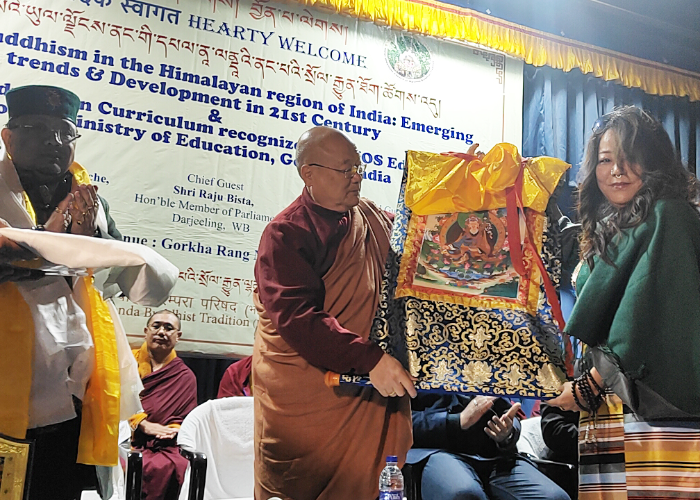The Himal World
Darjeeling, 9 February
Members of the Indian Himalayan Council of Nalanda Tradition (Indian National Sanga of Nalanda Buddhism) on Sunday organised a national seminar-cum-workshop on ‘Nalanda Buddhism in the Himalayan Region of India: Emerging Trends and Development in the 21st Century’ and Monastic Education Curriculum recognised by NIOS Education Board, Ministry of Education, Govt of India.
According to the organisers, the event at the Gorkha Rangmanch Bhawan in Darjeeling aimed at delving into the rich heritage and contemporary relevance of Nalanda Buddhism in the Himalayan region, as well as the evolving landscape of monastic education in the modern era.
The new curriculum will start from March this year in all the affiliated monasteries in different parts of North Bengal and is under the norms of the National Education Policy 2020, organisers said.
In attendance at the seminar were Partha Sarathi, Academic Officer, Noida, as the guest of honour, while Rimpoche Khenchen Lha Tsering, Rimpoche of Tasiding Monastery Sikkim, Darjeeling MLA Neeraj Zimba and other distinguished personalities.
The welcome address was delivered by the Vice President of the Indian Himalayan Buddhist Council of Nalanda Tradition IHCNBT, while the Secretary of the organization, Maling Gombu, highlighted the seminar and workshop.
According to the organisers, West Bengal is home to a significant Buddhist population, numbering around 12 lakh, with the majority residing in areas such as Darjeeling, Kalimpong, Siliguri, Salugara, and Jaigaon, where the rich cultural heritage and history of Buddhism continue to thrive, making these regions an important center for the Buddhist community in the state.
“The Indian Himalayan Buddhist Council of the Nalanda Tradition (IHCNBT) plays a pivotal role in preserving the unique and rich cultural heritage of Buddhism in the Himalayan region, particularly by safeguarding the ancient practices, teachings, and rituals passed down through generations. Rooted in the Nalanda Tradition, which traces its origins to the famous Nalanda University in ancient India, the Council emphasizes the importance of not only maintaining the spiritual aspects of Buddhism such as meditation, monastic discipline, and philosophical study but also safeguarding the artistic, architectural, and cultural elements integral to the Himalayan Buddhist identity,” they added.
Through its outreach programme, the IHCNBT aims to connect various traditions of the Nalanda Buddhist Tradition, even in the remote regions of the Himalayas. So far, the IHCNBT has organised several conferences and seminars in places like Ladakh, Sikkim, Kalimpong, Jemey Thang, Shimla, Taksing, Tuting and others. Now, the IHCNBT is set to host a conference in Darjeeling.
The Council also promotes interfaith dialogue, cooperates with local governments, and collaborates with international Buddhist organizations to ensure that the unique cultural heritage of Himalayan Buddhist communities is preserved and respected in an increasingly globalized world.
“The Indian Himalayan Buddhist Council of the Nalanda Tradition has recently achieved a significant milestone by completing the translation and preservation of Bhoti texts and Boudh Darshan texts in collaboration with the National Institute of Open Schooling (NIOS), an education board in India. This achievement is a momentous step in ensuring the continuity and accessibility of ancient Buddhist knowledge, particularly for younger generations in the Himalayan region and beyond,” the IHCNBT said.









Leave a Comment